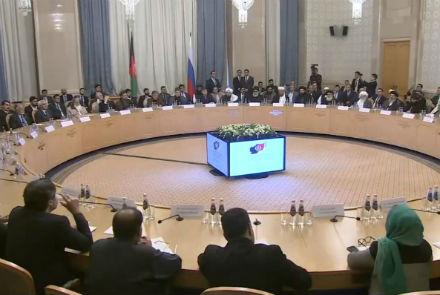The two-day meeting between Afghan politicians and Taliban members in Moscow was concluded on Thursday with a joint statement issued by the delegates.
The two sides held discussions on the Afghan peace on May 28 and 29 and on Thursday issued a statement that highlights the discussed issues.
The statement says that important issues which are knotted with Afghan people’s destiny were discussed and ways to achieve peace and stability were sought.
“Both sides discussed the continuation of intra-Afghan talks, ceasefire, the release of prisoners, protection of civilians, foreign troop withdrawal, end of the "foreigners' interference", the perseverance of national sovereignty, and women rights,” the statement reads.
The statement says both sides have made some progress on a number of issues but no agreement was made "because reaching agreements needed more discussions".
“There were some new issues which we discussed. Some of the issues were finalized and some were not. It was decided that those issues which were not finalized should be discussed in the next meeting,” said Suhail Shaheen, a spokesman for Taliban’s Qatar office.
Meanwhile, a delegate of the Moscow meeting said the two sides on Wednesday worked on a 12-article statement, but disagreements on ceasefire caused them to only issue a short statement.
Atta Mohammad Noor, chief executive of Jamiat-e-Islami, said that although they talked with the Taliban for nine hours to reach an agreement on a ceasefire, the discussions were “fruitless”.
Noor said the Taliban did not have “convincing reasons” for not accepting a ceasefire.
“The Taliban did not have convincing reasons. But you know that the start of peace is a ceasefire,” Noor said.
“Ceasefire is a crucial issue. We demanded that they also wanted it, but it will be reached in its time,” former President Hamid Karzai said.
The statement issued after the Moscow meeting reads that the two sides will continue their discussions in the future to build up the agreements made in the last Moscow meeting in February.
In February also, a number of the Afghan politicians met the Taliban members in Moscow where they held a two-day discussion on the Afghan peace and at the end issued a joint declaration.
Reports indicate that the next round of intra-Afghan meeting will be held in Doha, but the timing is not specified.
Although Moscow meeting has not been productive as it witnessed no agreement, the question is that to which extent the politicians and the Taliban had the authority to make a decision about the Afghan peace?
“It belongs to our political will, to our seriousness, to our political commitments, not to one side, but for both sides,” Farkhunda Zahra Naderi, a former advisor to President Ghani said.
Meanwhile, the Afghan Institute for Strategic Studies hosted a meeting on Thursday in which TOLOnews Director Lotfullah Najafizada shared his notes about his study tour of Colombia on its peace process and what Afghanistan can learn from it at this critical juncture.
“As much as we study Colombian conflict, we learn that there are many similarities between Afghanistan and Colombian conflict,” he said.



Comment this post